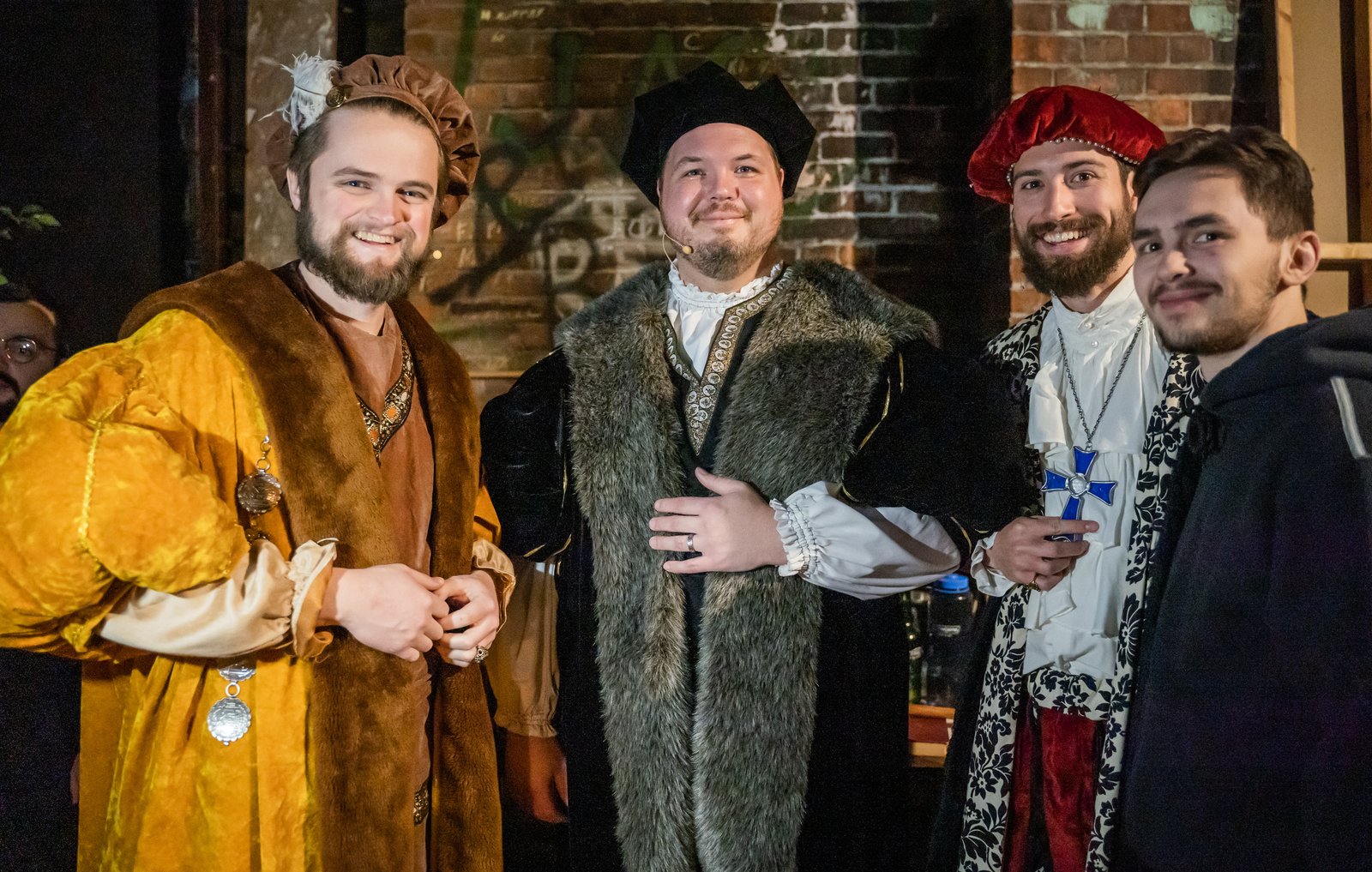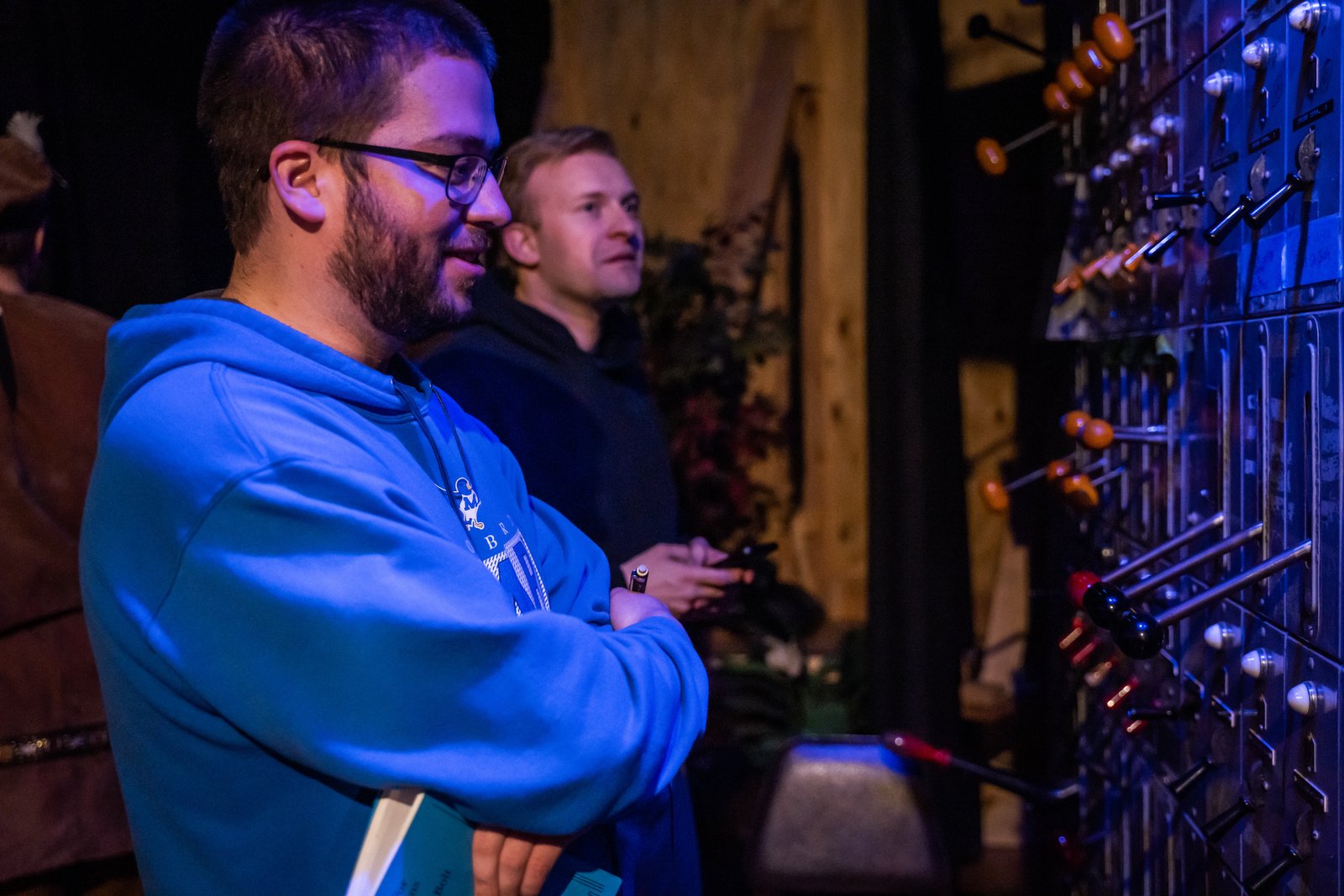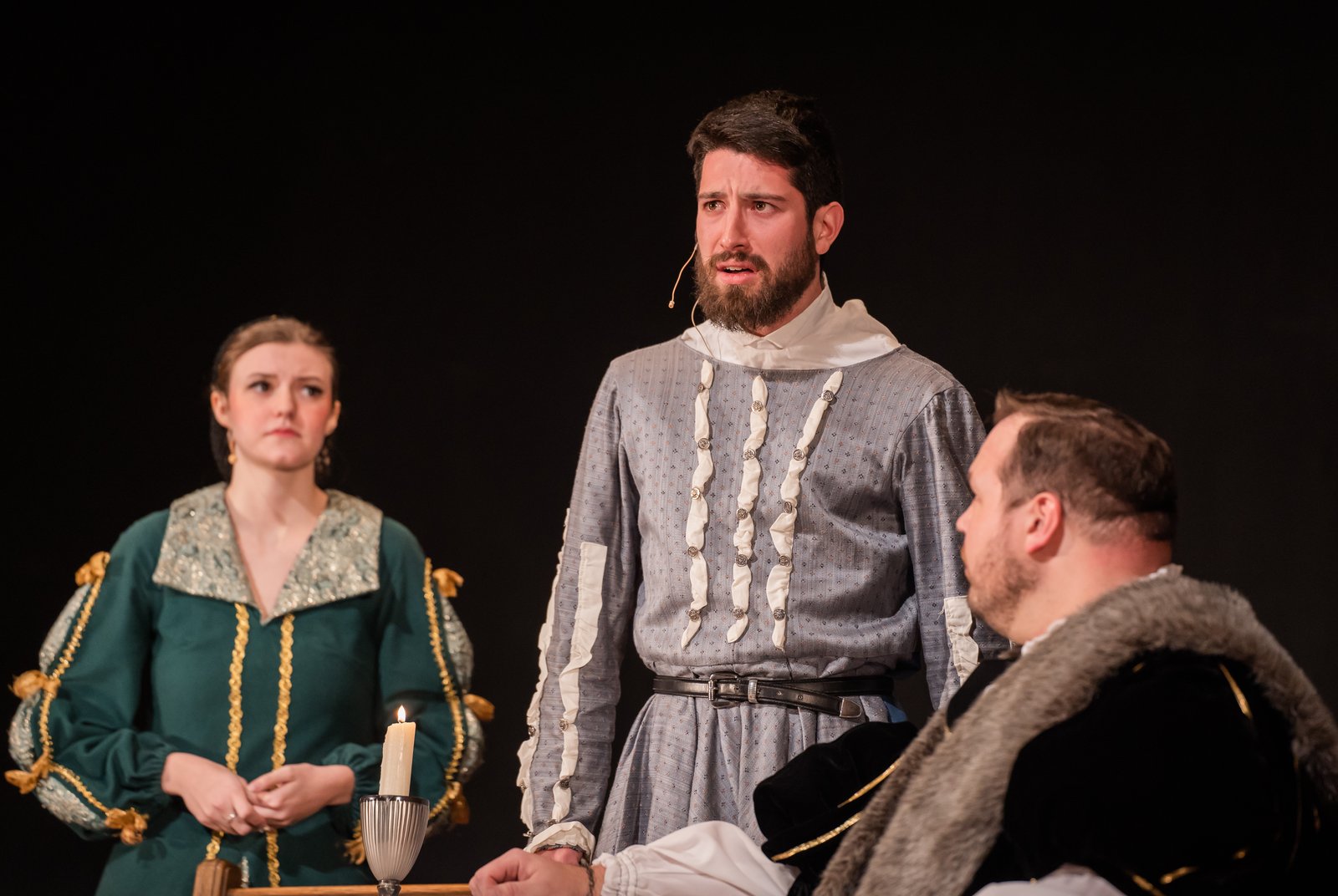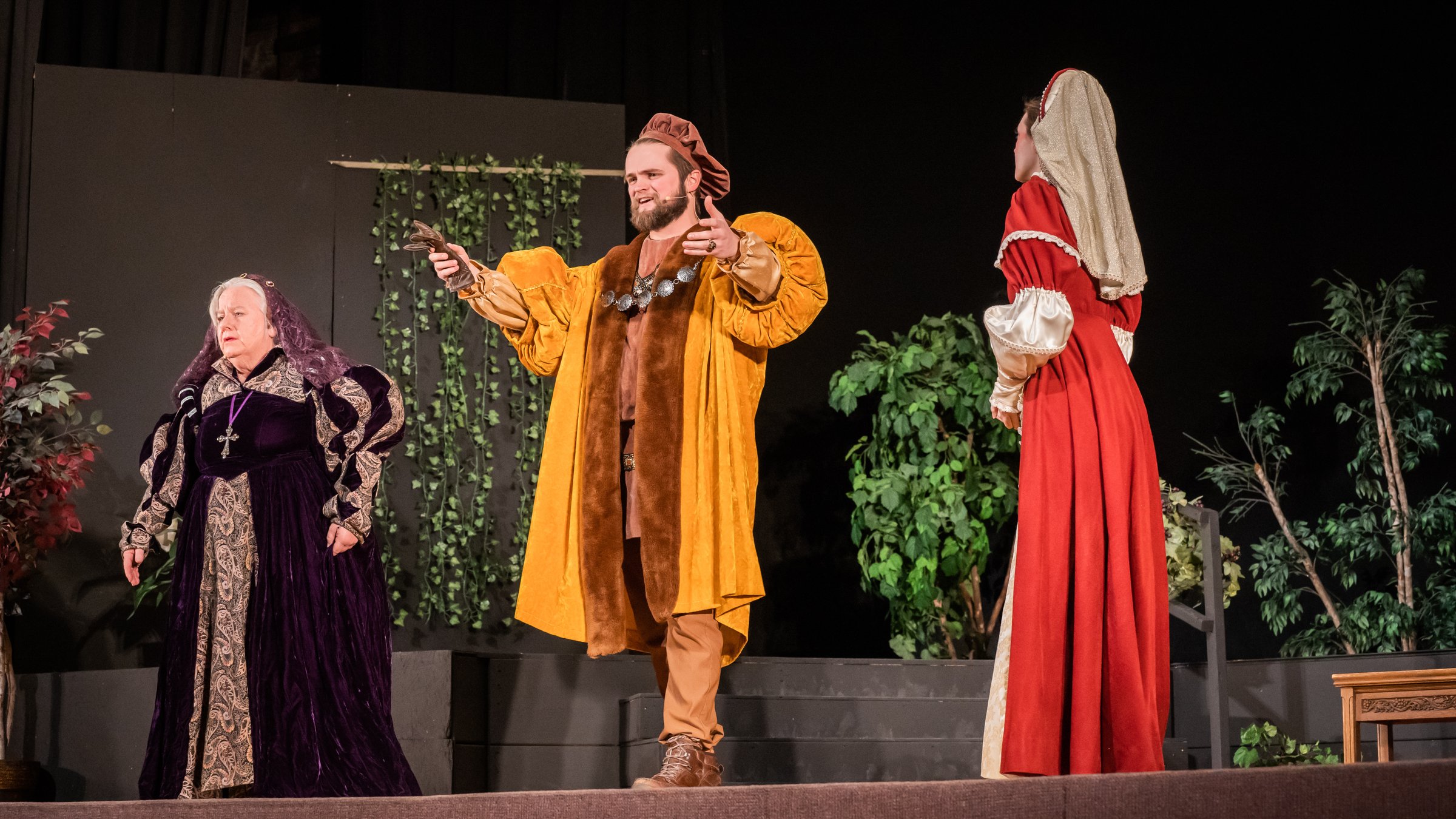First theatrical performance since pandemic draws 400 to seminary's auditorium as seminarians act, direct and produce drama
DETROIT — After four years, the lights were switched on and the curtains drawn back on the Sacred Heart Major Seminary stage for the spring theatrical production.
Seminarians performed "A Man for All Seasons" to the delight of audiences on March 24 and 25.
Approximately 400 people attended the play, which was written by Robert Bolt and first published in 1960. The story portrays the life of St. Thomas More, who served as Lord Chancellor during King Henry VIII’s reign and was faced with a difficult choice: be loyal to the king or to his conscience.
Deacon Jeremy Schupbach from the Archdiocese of Detroit and Theology III seminarian Steven Caraher from the Diocese of Gary co-directed the play. Twelve seminarians took on roles in the cast, with Deacon Andrew Smith from the Archdiocese of Detroit playing the role of St. Thomas More. Ruth Lapeyre, the voice instructor at the seminary, played the wife of the great saint, while Rhonwyn Martin, a commuter student studying theology, acted as the daughter. More than 20 seminarians worked behind the scenes on stage crew, costumes, promotions, hospitality and set construction.

In 2019, the seminary presented the play "Twelve Angry Men." Early in 2020, seminarians began to rehearse "Stalag 17" for their spring presentation, but had to stop rehearsals because of the pandemic.
Deacon Schupbach and Caraher were eager to resurrect the theater program for the 2022-23 school year. Both had been involved in theater when they were in high school. Deacon Schupbach performed in seven plays at Everest Collegiate in Clarkston, and Caraher obtained a minor in theater from Indiana University. They discussed their options for the seminary’s return to the stage and chose "A Man for All Seasons."
“It’s a really great story of a venerated saint in our Church,” Caraher said. “I think it’s been a blessing for me personally and for the seminarians as we retell the story of this saint we all admire — a saint who was a man for his time and a man for our time, too. He wasn’t willing to be swept up by the current of modern thought and wanted to be grounded in the truth. This was a beautiful opportunity for us to tell that story.”
Interested seminarians auditioned for the play in December. Upon returning from Christmas break, the seminarians got to work, spending many hours each week rehearsing and learning lines for the nearly three-hour production.
Leading up to the opening night, Caraher and Deacon Schupbach consulted their canon law professor, Edward Peters, Ph.D., who knows the play and its history well. The two were thrilled to hear that the account accurately depicts the events of St. Thomas More’s trial in 1535. More’s son-in-law had hired a scribe to document the trial, but the man ran out of paper partway through. That scene in the play ends where the paper ran out.

Both co-directors were inspired by the fact that St. Thomas More was willing to give his life even though he didn’t intend to be a martyr, or even see himself as one. Caraher quoted one of his favorite lines in the play, which is spoken as St. Thomas More’s family begins to worry that his life might be in danger. More tells them, “Don’t fear. This is not the stuff that martyrs are made of.”
“He was a very intelligent man who knew the law better than anyone, which is ultimately why they needed someone to perjure himself in order to convict him. I love that St. Thomas More’s mind is the tool he uses,” said Deacon Schupbach, who played the role of Thomas Cromwell in addition to co-directing. “He was willing to lay down his life for the truth, but he also loves his life enough to cling to it with all he’s got.”
Audience member Kevin Erskine brought the two oldest of his six children, Xavier, 15, and Kieran, 13, to see the play.
“My sons are big history fans, and seeing this tonight was fantastic. The play itself was wonderful — a story of truth and silence,” Erskine said. “As a lawyer and a father, the story really struck a chord with me that St. Thomas More was willing to give up everything he had for the truth.”
The Erskine boys appreciated seeing the seminarians’ theater skills on display. As musicians — both play piano and Xavier plays violin in an orchestra — they were encouraged to see the men from the seminary pursuing their interests while studying for the priesthood.

Kristin Peters from Our Lady of Good Counsel in Plymouth came to the show with her husband and youngest daughter, a seventh grader. They had never been to a play at Sacred Heart, nor to the seminary for any reason.
“I thought it would be good to go and see the show, the seminarians, and the seminary. It’s always good to keep our seminarians in mind and in prayer,” Peters said. “We thought the play was very well done. The acting and costumes were great, and I thought the seminarian who played Sir Thomas More was wonderful.”
Caraher and Deacon Schupbach were glad to welcome people back to the seminary after several years of a quiet stage. They pray the annual spring production will continue without interruption for years to come, not only for the seminarians to be able to use their talents and artistic gifts, but also to establish important connections with the people they’ll one day serve in parishes.
“There’s a strong monastic element to our formation because we have to learn, first and foremost, how to be intimate friends with Jesus. But we also need to learn how to be public people so that we can bring God’s grace to others,” Deacon Schupbach said.
This story was first published in Mosaic, the online and print magazine of Sacred Heart Major Seminary.
Support Sacred Heart Major Seminary
To support the education and formation of future priests, deacons and lay leaders through Sacred Heart Major Seminary, please consider a gift through the Catholic Services Appeal. Visit give.aod.org to learn more.
Copy Permalink
Sacred Heart Major Seminary












